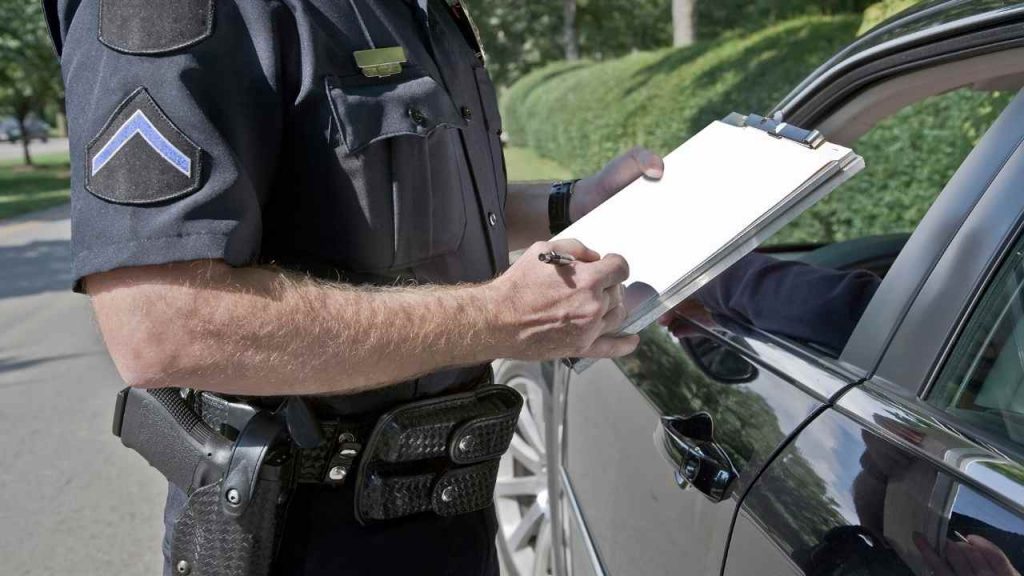Picture this: You’re driving down the highway when suddenly you’re pulled over for speeding. The worst part about it? You’re on vacation. Speeding is a dangerous thing to do because you run the risk of getting into an accident and causing damage to both vehicles and bodily harm to all who are involved.
In this article, we’ll go over all you need to know about getting an out-of-state speeding ticket. We’ll also look to answer this question: Will an out-of-state speeding ticket affect insurance? We’ll even look at ways to avoid getting a speeding ticket in the future.

The Process of Getting an Out-of-State Speeding Ticket
There are a lot of moving parts when it comes to getting an out-of-state ticket. Below, we will look at each part of the process in detail.
#1 – You Get Pulled Over and Ticketed
This first part of the process is embarrassing. You get pulled over by a police officer and are written a ticket for speeding.
#2 – Your Home State Gets Notified of the Ticket
The Driver’s License Compact, signed by 45 states, is an agreement between these states to share information about drivers that get moving violations. When you get an out-of-state ticket, the state where you got the ticket notifies your home state.
#3 – Your Home State Adds Points to Your License
Depending on where you live, your home state will add points to your license. States like New Jersey will add two points for a moving violation. Check with your home state to see if they penalize you for speeding in another state.
#4 – You Have to Pay the Ticket
It’s harder to contest a speeding ticket in a state that isn’t your home. If you decide to do so, you will need to report to the county’s court system where you got the ticket. More than likely, you will have to pay the speeding ticket.
Speeding tickets that are from out-of-state usually cost $150 or more, depending on how fast you were driving.
#5 – The Violation Goes on Your Record
Speeding is a moving violation and goes on your record. Again, this all depends on what state is your home state, whether that state is a part of the Driver’s License Compact, and how fast you were going.
This process can happen in various ways, but overall, this is the process for getting an out-of-state speeding ticket.
As stated previously, speeding is a dangerous thing to do and should be avoided at all costs. Engaging in this kind of behavior puts you and those around you at risk. Cars can be replaced and repaired to be as good as new; people cannot.
How an Out-of-State Speeding Ticket Affects Insurance
Moving violations can significantly raise the price of insurance. An out-of-state speeding ticket in particular can affect insurance rates by nearly 23%. That’s a big jump.
When you are caught speeding one too many times, you can be labeled as a high-risk driver, which can cause you to lose good driver discounts from your provider and raise your insurance rates substantially. In some cases, your provider will stop insuring you because of your reckless driving.
How to Avoid Getting a Speeding Ticket
No one wants to be labeled as a high-risk driver. Below, let’s look at some ways you can avoid getting a speeding ticket.
Make Sure You Have Enough Time to Get to Your Destination
Too many times, people are speeding because they are in a rush to get to their destination. Make sure you have enough time to get to where you want to go. Trying to rush can get you into trouble. Slow down, relax, and enjoy the journey.
Get Acquainted With the Traffic Laws of Where You’re Driving
If you’re going across the country, take the time before you leave to know how each state deals with speeding. It might help you be more aware of your surroundings. It also will help keep you and your vehicle in good health.
The Importance of Driving Safely When on Vacation
Driving safely and responsibly doesn’t end because you’re on vacation. You need to be alert and drive defensively. You need to follow road signs and speed limits wherever you go. Doing so will help you and others to stay safe.